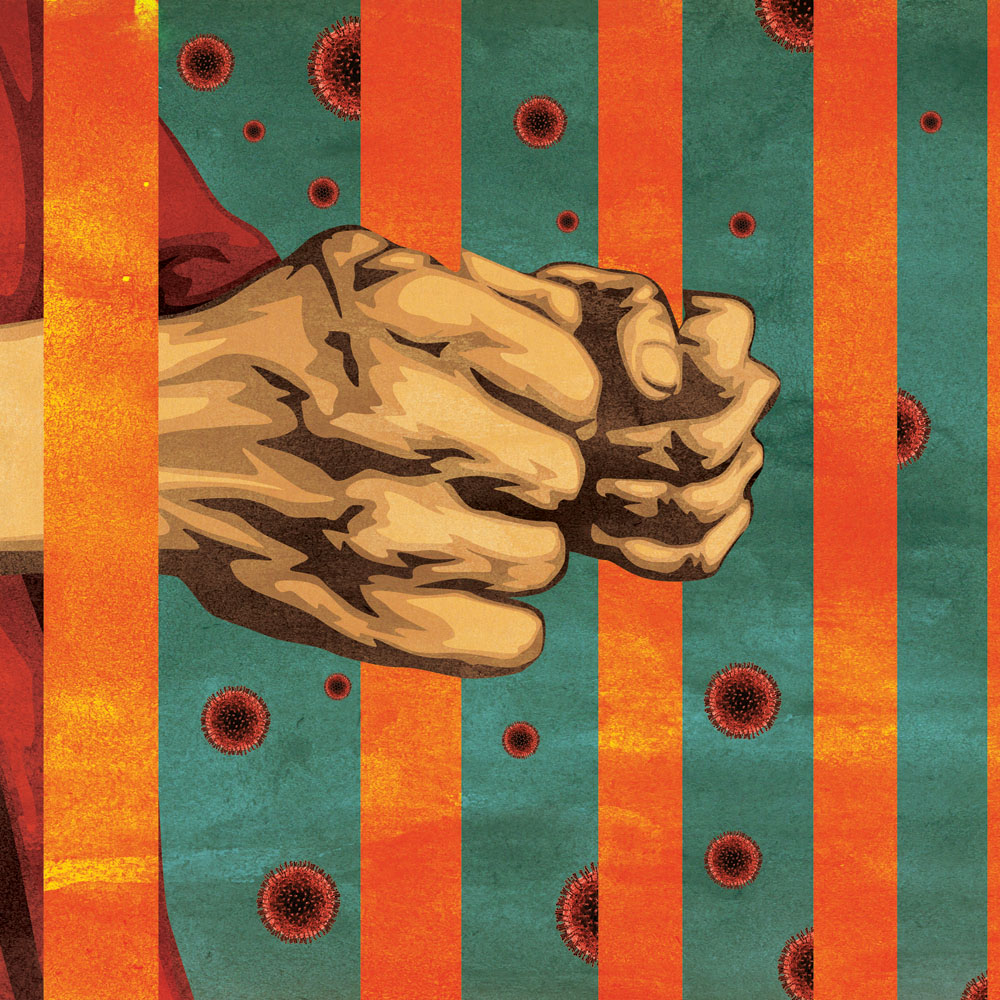Portugal // Prison in the time of coronavirus~ 7 min

As the pandemic progresses, there are growing concerns about the prison population all over the world. In Portugal, where there are already at least ten cases inside prisons, there is fear of a major tragedy in the overcrowded prisons, where hygiene conditions are poor and there is limited access to cleaning products.
The first covid-19 infections in Portuguese prisons were confirmed about two weeks ago – two cases in the prison of Caxias (a medical assistant and an inmate incarcerated on the night of March, the 27th) and one case in the prison of Custóias (a guard). Now, there are at least ten cases among guards and medical workers. Rumors say there are more cases inside the jails, although no more cases have been officially confirmed. Panic spread during these last weeks among the prisoners, who recorded several videos already spreading in social networks. Feelings of abandonment and insecurity, together with poor hygiene conditions and the nonexistence of protective equipment for guards, cooks and other workers going in and out of the prisons daily, gave rise to threats of upcoming revolts, unless there was a quick release of prisoners. The recently announced release of prisoners is nonetheless far from being a final solution for the high risk of the new coronavirus falling upon the prison population.
Miguel Maravalhas, who was recently released, talked to Público and provided a glimpse of the situation in the prison of Santa Cruz do Bispo, in Matosinhos. In this prison, soap and bleach are given to the prisoners to wash their cells, but they have to buy the remaining cleaning products at the bar. As concerns personal hygiene, “one bar of soap, a toothbrush and a toothpaste, two razor blades” are given to the prisoners every fortnight, but only to those who get no visits. No products are given to prisoners who receive visits. The prison guards’ trade unions have also been reporting on the lack of sanitizers and that a mixture of alcohol and water is used to replace sanitizer gel.
In a video recorded in the prison of Coimbra, prisoners report the lack of prevention and care, and that both guards and cooks walk around with no masks. In the words of the prisoner in the video from Coimbra, “if the state has no conditions to ensure our safety, it has to let us out. We have to be realistic, yes we made mistakes and we are paying for them, but we are talking about a global pandemic. In the streets, and in the streets there are conditions, the number of deaths and infected rises everyday. If this enters the prisons, we are sentenced to death. It is what it is, let’s not have any illusions.” In a video recorded in the prison of Castelo Branco, the prisoners showed a dormitory where 10 people live, with access to a single toilet, and said that they are given only a small bottle of bleach per week. More videos have shown up in the last weeks on social networks with messages from prisoners in Lisbon, Guarda, Izeda, Paços de Ferreira and Custóias. Meanwhile, several other videos have erased from social networks.
In mid-February, a contingency plan for the prison system, aiming to avoid infections by the new coronavirus, was published. Visits to prisoners were forbidden in the Northern region on March 9th and, a few days later, in the entire country. Therefore, prisoners became even more isolated from the outside world, having only 15 minutes a day to speak to their families. A mandatory quarantine of 14 days was also declared to new prisoners and to those returning to jail after prison furloughs. Everything, supposedly, for their own good.
However, guards, teachers, social reintegration technicians, health workers and kitchen staff kept going in and out of prisons everyday. At the time of the statements given by Jorge Alves, president of the National Trade Union of Prison Guards (SNCGP), to Jornal I, about two weeks ago, prisoners were having their temperatures checked, but guards were not subjected to any kind of control. We don’t know if this situation has changed in the meantime. What we do know is that guards and other workers are the main path for the virus to reach the prisoners.
According to the trade union, the guards are not allowed to “walk around with a mask inside the prisons to avoid generating social alarm among the prisoners”, but the fact that they are not using any protection is the very reason why the prisoners are alarmed. As everybody knows, an infected person can infect others before showing any kind of symptoms, and that’s not being prevented. According to Miguel Maravalhas, “one positive case would be enough to contaminate whole wards”. This is especially true in overcrowded prisons ─ and, with the exception of the special prisons of Évora, the feminine prisons and the Prison Hospital of São João de Deus, in Caxias, every other Portuguese prison is overcrowded.
According to the latest data released by the Ministry of Justice, 1070 people are imprisoned in the prison of Custóias, in Oporto, although its maximum capacity is 686 prisoners. Still according to the president of SNCGP, “If there is one case in this prison, there will be 1000 cases”.
After the appearance of the first videos with messages from the prisoners, the Ministry of Justice announced, on March 30th, that 13 900 masks had been distributed to the prisoners of all jails, which should be enough for “the next seven days”. Considering that there are around 13 thousand inmates in the Portuguese prisons, we can therefore conclude that the Ministry of Justice thinks that one mask is enough for a prisoner to be protected during seven days. The mathematics of the authorities never ceases to surprise.
Meanwhile, the government announced an amnesty for people sentenced to up to two years and to prisoners in the last two years or less of their sentences. This amnesty is granted to those sentenced for crimes like non-payment of fines and taxes, crimes against property, forgery and breach of trust. Excluded are those convicted for heinous crimes like murder, domestic violence, maltreatment, sexual crimes, aggravated theft, criminal organization, corruption, money laundering, arson and drug trafficking, as well as public or political office-holders and members of security forces. A total of about 2 thousand people may be released.
Although it’s not a bad starting point, this measure will not solve the conditions that make the prisons places highly favorable to the spread of the virus. As we have previously stated, most of the Portuguese prisons are overcrowded. If we believe official data from 2016, the global occupation rate is 109%, but the reality is not the same for every prison. In the prison of Custóias, for example, there are now imprisoned 384 more people than what the prison is prepared to hold – which represents an occupation rate of 156%.
The release of 15% to 20% of the prison population is, therefore, insufficient to solve the problem of overcrowding. In several of the videos recorded by the inmates, as well as in texts published in social networks by family members, calls have been made for broader measures to allow those imprisoned to spend these hard times with their families. Although these are against the release of those convicted of “blood crimes” (murder, rape, and abuse, among others), they demand that all others have their sentences commuted to house arrest, regardless of the duration of their remaining sentences. They acknowledge they made mistakes and are paying for them, but demand to be treated as human beings. They do not accept to be left on what some are calling “death row”.
According to the lastest data from the Council of Europe Annual Penal Statistics, 15.5% of the Portuguese prison population is in jail for crimes related to drug trafficking. Although we don’t have concrete figures, we know that a large portion of those convicted for drug trafficking did not perpetrate violent crimes against others. The biggest crime committed by these people, who may be hundreds or even exceed one thousand, was being born in contexts of great poverty and not being given by society any real perspectives of providing for the most basic needs of their communities.
According to data from 2016, Portugal is one of the European countries with the most overcrowded prisons, together with Italy and Serbia. Only Macedonia, Hungary, Cyprus, Belgium and France rank worse than these three countries.




